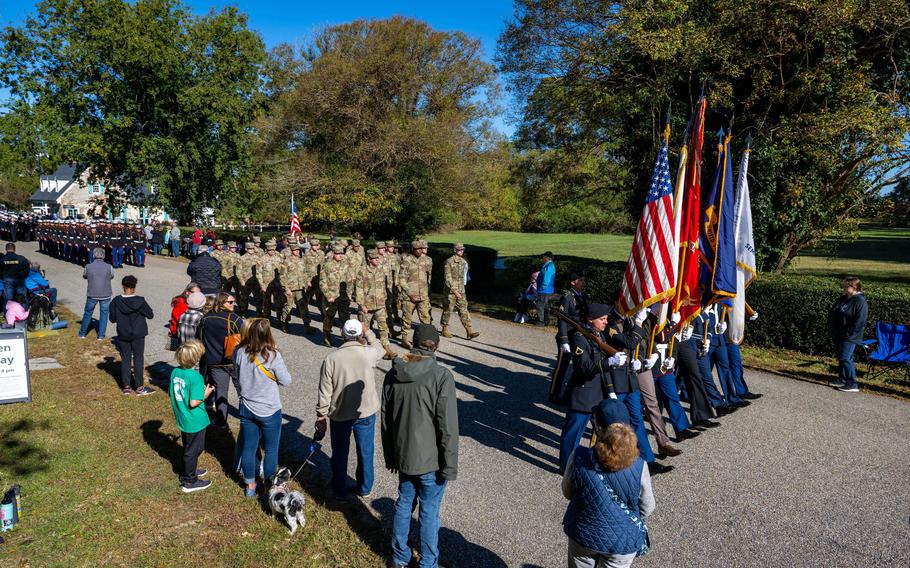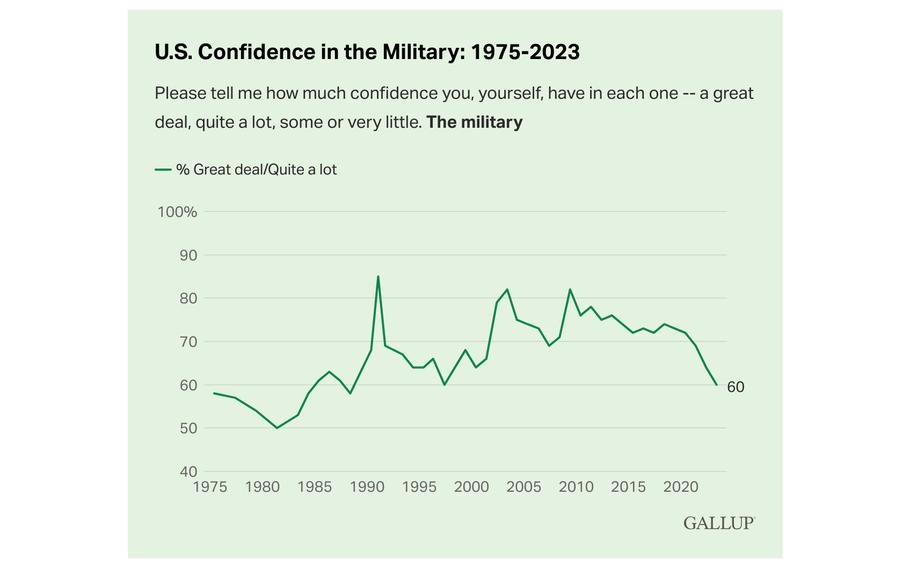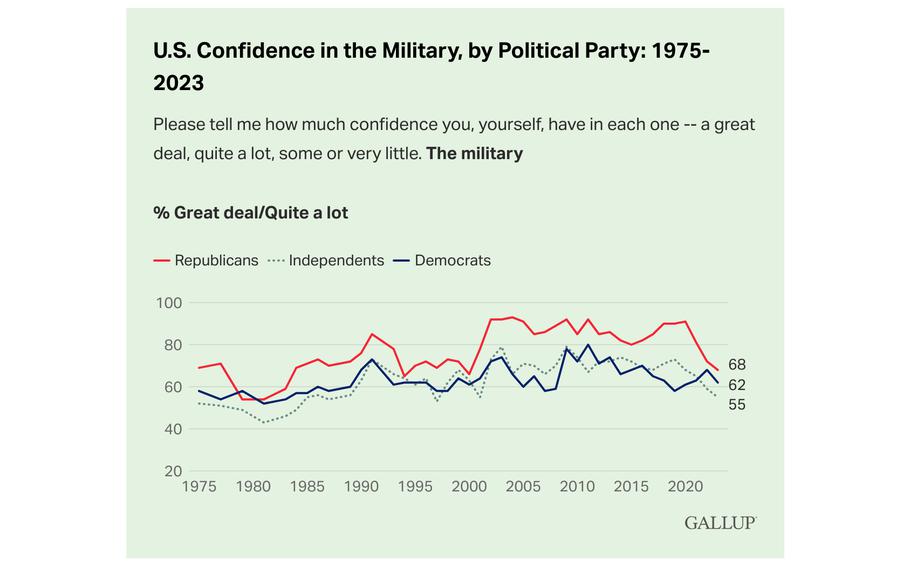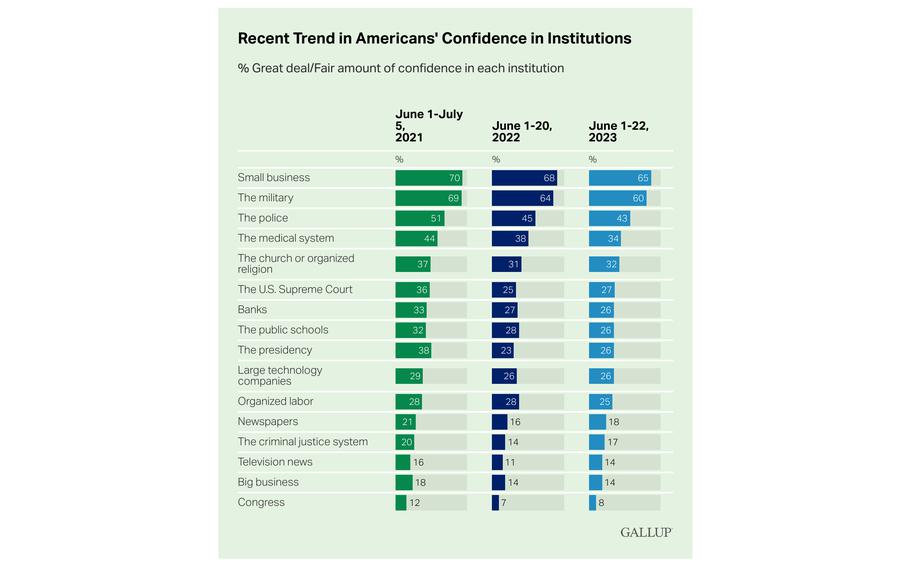
Service members march in the Yorktown Parade in Fort Eustis, Va., on Oct. 20, 2022. A recent Gallup poll gauged public trust in the military at 60%, the lowest in 26 years. (George Prince/U.S. Army)
Americans’ confidence in their military has reached its lowest point in the past 26 years, prolonging a steady decline in public opinion dating to 2018, recently released poll results show.
The drop is part of a greater trend of decreasing trust Americans have for nearly all of the country’s institutions, many of which have come under fire by political leaders in recent years.
In the Gallup survey, conducted from June 1 to June 22, 60% of respondents expressed a great deal of trust or quite a lot of trust in the military, the lowest number since 1997.
Although the decline showed up across the political spectrum, the results indicate a continued divide among Americans along partisan lines.
“Republicans have been the most likely to express confidence in the military, and they remain so today,” Gallup said in a statement Monday.

Americans' confidence in their armed forces hit a 26-year low, according to a Gallup poll conducted in June. Results show that 60% of respondents expressed some level of trust in the military. (Gallup)
However, GOP approval of the armed forces has dropped more than 20 percentage points in three years, from 91% in 2020, when Donald Trump was president, to 68% now.
Under the Biden administration, the Defense Department has faced repeated Republican accusations that the military is "woke."
A 2022 report authored by Sen. Marco Rubio, R-Fla., and U.S. Rep. Chip Roy, R-Texas, complained of a "sustained assault" of "woke virtue signaling" in the services.
They called out actions by several high-ranking DOD officials and programs implemented across the military as politically driven and overly focused on diversity and inclusion.
One example they cited was Defense Secretary Lloyd Austin's 2021 order directing all service members and civilian DOD employees to discuss extremism in the ranks following the Jan. 6, 2021, attack on the U.S. Capitol.

Republicans remain more likely than Democrats to have trust in the U.S. military, according to the latest Gallup poll on the topic. Even so, GOP approval of the armed forces dropped from 91% in 2020 to 68% in 2023. (Gallup)
Two years after the stand down, Austin grew visibly frustrated when again confronted on the measure by Republican lawmakers during a Senate Armed Services Committee hearing in March.
“We have always had regulations against extremist behavior,” Austin told the committee March 28. “And you have heard me say that 99.9% of our troops are focused on the right things each and every day. But in this case, a small set of actions can have outsized impact.”
Democrats’ confidence in the military initially improved after Biden took office in 2021, but the uptick has been reversed in each of the two subsequent years.
The results, first released July 6, are based on telephone interviews with more than 1,000 U.S. adults aged 18 and older via both landline and cellphone numbers. The poll had a margin of error of 4 percentage points.
Gallup has been tracking public opinion of the military since 1975, and the surveys have shown dramatic fluctuations based on global and national events.
For much of the Cold War, Americans’ confidence in the armed forces consistently ranged between 50% and 58%.

Despite an ongoing decline in public confidence in the military, the U.S. armed forces still fared far better in Gallup’s June poll than almost all other institutions, including law enforcement, the U.S. Supreme Court and the presidency. (Gallup)
President Ronald Reagan's two terms in office in the 1980s saw a resurgence in their outlook on the military. Favorability levels hit 85% in 1991 after the Gulf War and again after the 9/11 terrorist attacks a decade later, Gallup said Monday.
An “era of elevated confidence” followed throughout the two major wars in the Middle East, lasting until 2021, when public trust in the military plummeted to 69% in the wake of the American exit from Afghanistan, according to the statement.
Despite the drop, the military fared well in comparison with other major American institutions.
Public confidence in 11 of the 16 institutions tracked continued to stagnate, with none showing significant improvements from record declines in 2022.
The police, the next-highest-rated public institution after the military, had the trust of only 43% of poll respondents, a new all-time low.
The presidency and Supreme Court were among the hardest-hit institutions, with only 26% and 27% of Americans expressing a great deal of confidence or a fair amount of confidence in them, respectively.
"Public confidence in American institutions is still on a downward trajectory, and many are at or near rock bottom," Gallup said in a July statement.
riedel.alexander@stripes.com Twitter: @lexRiedel